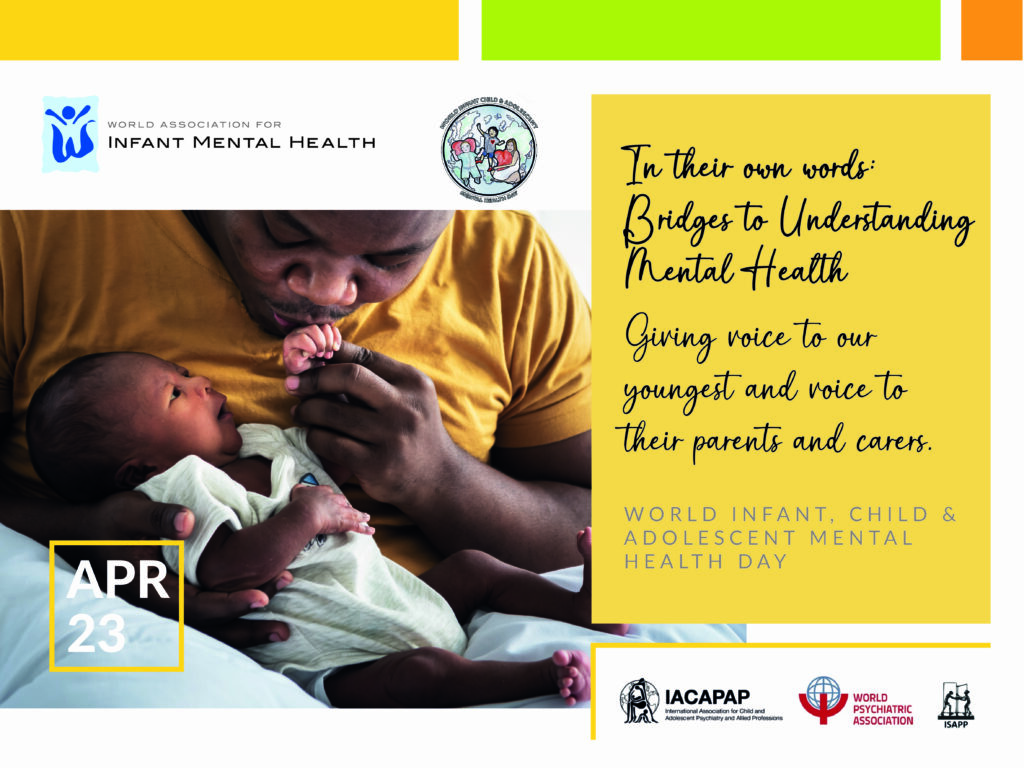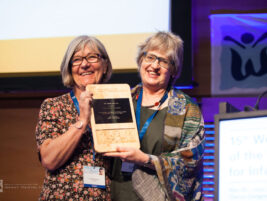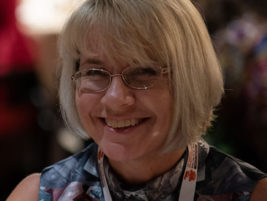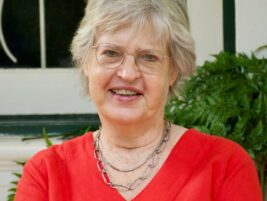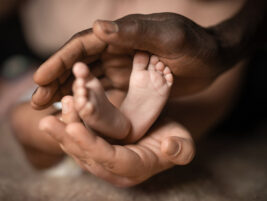Join us to commemorate World Infant, Child and Adolescent Mental Health Day!
In Their Own Words: Bridges to Understanding Mental Health
International symposium to be held on 23 April 2024
Dear colleagues,
The presidents of each of four professional mental health associations, WAIMH, WPA, IACAPAP and ISCPPC, working towards best mental health care for infants, children, and adolescents, decided just over two years ago that there should be a day each year where people around the world are able to focus on the mental health needs of our infants, children and adolescents. This day was chosen to be 23 April 2022, and the same day each year thereafter.
We know that in our current world is a greater recognition that infants, children and adolescents can experience major mental health difficulties, and a pressing need to support families and provide services for the young people.
This year the theme is “In Their Own Words: Bridges to Understanding Mental Health”.
The committee felt that the focus should be on the lived experience of mental ill-health as experienced by children and their families, and in particular how do we hear from our youngest people and their families, in their own words about their problematic experiences. Giving voice to the child.
The voice of the child, and the voice of the parents provide a bridge between their experience of mental ill-health, and the professionals understanding.
How do we get to hear the infant’s voice? How do we know what the infant is feeling and thinking… Can they tell us? There has been much research over the last few decades clearly documenting the infant’s capacity for communicating with us; revealing to us their capacity for excitement, distress, sadness and anger, a broad range of emotions and states. As they develop ways to communicate to us their level of understanding of important relationships, their own experience and the world around them. As Donald Winnicott, paediatrician, psychoanalyst, and pioneer in infant mental health (1960), famously said: “….’there is no such thing as an infant’ meaning, of course, that wherever one finds an infant one finds maternal care, and without maternal care there would be no infant.”
The baby has an amazing capacity to communicate directly with us, using their gaze, voice, facial expression, hand other body movements, capacity for crying… The baby has powerful ways of letting us know something of their own feelings, thoughts and perhaps their intentions (Trevarthen, 2011).
For the baby, there parents, and others in the family, constitute the window, and the doorway into the bigger world. For parents the arrival of a baby into their life, whether there are older siblings or not, constitutes a huge transitional moment in their lives. Parental ill-health in the perinatal period is sadly very prevalent, and one in five in some communities, and even more prevalent in families experiencing the trauma of war and displacement.
I am very pleased and honoured to be joined in this seminar by Renee Knight, who is a lived experience advisor with PANDA, (Perinatal Anxiety and Depression Australia) and has generously agreed to participate in our symposium. Renee is passionate about the importance of greater community recognition of perinatal mental health difficulties experienced by mothers and fathers in all communities, but also keen for us to understand the infant’s experience where parents have perinatal mental health difficulties. Renee will share something of her own experience of the darkness of postnatal depression and help us walk across the bridge to understanding of the parent’s and baby’s experience of distress and the pathways to recovery.
Campbell Paul
President, World Association for Infant Mental Health
References
Trevarthen, C. (2011). What is it like to be a person who knows nothing? Defining the active intersubjective mind of a newborn human being. Infant and Child Development, 20(1), 119-135.
Winnicott, D. W. (1960). The theory of the parent-infant relationship. International Journal of psychoanalysis, 41(6), 585-595.
Webinar
Join us at the WICAMHD 2024 webinar as we listen to lived experiences and engage in a panel discussion under the theme “In Their Own Words: Bridges to Understanding Mental Health.”
Date: 23 April 2024, Tuesday
Time: 1.00 PM CEST Central European Summer Time | 7.00 AM EDT Eastern Daylight Time | 11:00 AM UTC
Duration: 60 minutes
The webinar is open to the public. This webinar will be conducted virtually via Zoom. There is no cost to attend, but registration is required in advance. Seats are limited and it’s based on a first come, first served.
Registration: https://us02web.zoom.us/webinar/register/1617115481913/WN_TEHDt2zkTRCsjNzH_SjPDQ#/registration
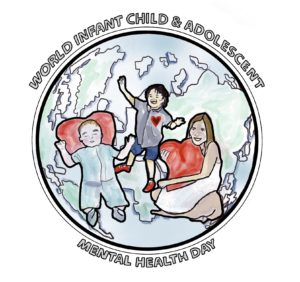
How to support WICAMHD 2024
Share the logo widely.
Use social media to spread your message about the importance of mental health in the young.
Please involve your communications teams and do it on all websites and social media platforms you are on.
We suggest the following hashtags: #WICAMHD #WICAMHD2024
More information
For more information, please visit: https://iacapap.org/events/world-infant-child-and-adolescent-mental-health-day/wicamhd-2024.html


